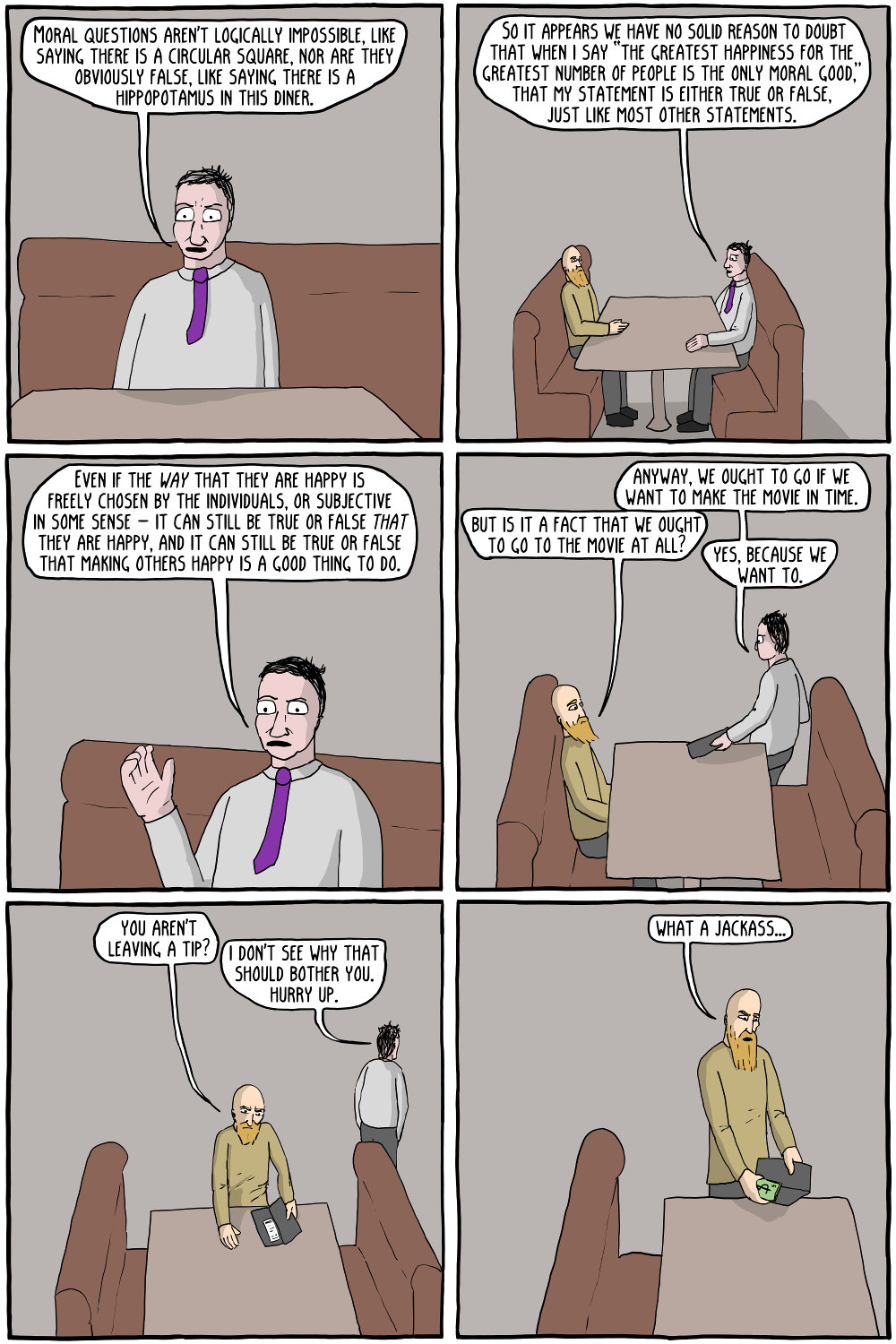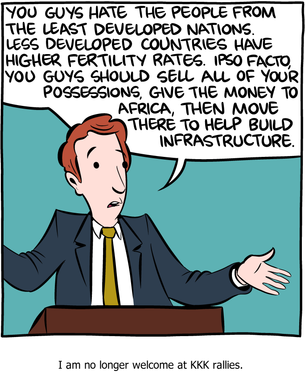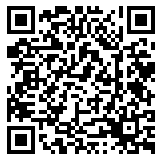Moral and ethical statements obviously rely on a framework for a determination of truth value. One cannot say “One ought to voluntarily work towards the extinction of the human race,” without a justification for such a claim. One such justification could be “Human beings are destroying the global ecosystem, therefore one ought to voluntarily extinct themselves.” That justification, though, can only be said to be valid if it is operating in a framework which dictates that moral statements are derived from some cosmic preservation principle (ignoring that humans are a natural part of that global ecosystem), or an aesthetic principle that is dependent upon the one uttering the statement, or a misinformed understanding of how one ought to achieve a particular valued state of affairs (if you value nature, humans ought to extinct themselves). Validity does not necessitate actually obtaining in reality, though.
In order to obtain, the statement and it's framework must comport to objective reality while also being logically valid and based on factual premises. “Don't murder because Jesus said so,” is an example of failing to meet these criteria while also stating a moral truth. I argue that “Thou shalt not murder,” is an easily defended and true objective moral fact. However, appealing to something Jesus is purported to have said is not an argument in defense of a statement, it is merely appealing to an authority hidden behind two thousand years of history. Additionally, exclusively using the Bible as a moral framework is impossible; without additional work done outside the realm of Scripture to inform one's interpretation of it will inevitably result in ridiculous statements, such as“homosexuality and abortion aren't sins because Jesus never mentioned them.”
If “Thou shall not murder,” is an objective moral fact, it requires some form of deductive or inductive argument to demonstrate its categorical nature and its unimpeachability. There have been numerous arguments made for such a claim, and I don't feel like pointing them all out. The first ones that come to mind, though, are Kant's formulation of the categorical imperative in “Grounding for the Metaphysics of Morals”, Rothbard's defense of the NAP in “War, Peace, and the State”, or Ayn Rand's formulation in “Man's Rights”. Essentially, the shortest and easiest formulation of “Thou shalt not murder” is thus:
- Murder can be defined as “killing an individual against their will without first facing the threat of murder from that individual”.
- The definition of a right necessarily extends to all individuals. If one has a belief in a right they or another possesses, it must necessarily extend to all individuals.
∴ If one individual has a right to defend themselves from murder, all individuals have the right to do so.
- If one denies the right of another to be secure from murder (demonstrated by killing them against their will) one is denying this right to themselves, thereby willing the possibility that they may be killed by another.
- In willing that another be able to murder oneself, it makes murdering this individual definitionally impossible, as unwillingness is a necessary condition for murder.
∴ If one murders another individual (or argues for the legitimacy of doing so), it does not revoke murder's definitional status as a violation of a right.
Of course, if one is arguing for objective moral facts, they are a deontologist of some sort. Most of which are divine lawyers, trying to figure out God's commandments based on revelation. While a noble effort, such activities are rarely compelling to those outside of whatever cult the divine lawyer is a part of. Deontology, then, is better suited to pursuing objective moral facts by way of rational and axiomatic inquiry into the nature of reality and of man's relationships.
Where Kant or any social justice warrior will argue that deontological maxims can be positive statements of rights, I argue that only the inverse is true. One cannot say with axiomatic certitude that “one must affirm life” is an objective, and therefore categorical, moral fact. An example of why one cannot say “one must affirm life” is because it breaks down in limit cases (and some not so limiting cases). For example, if one is witnessing a murder taking place, can one kill the murderer? Or, if one eats something unhealthy or neglects to devote all their resources to the sustenance of the brain-dead or the starving people on the opposite side of the globe are they committing a crime? Pope Francis' answers aside, I argue that these are obviously not the case. This line of reasoning is what has led to my mantra of “Murder, coercion, and theft are categorically unjust.” This far, these are the three behaviors I have found to be inconsistent with reason in every instance, by definition.
So, “Thou shalt not commit murder, coercion, or theft,” is a deontological objective moral fact. Something that simply exists no more or less than the matter from which my body is constructed, if in a different modality. Of course, as I've said before, this is a certainly stronger moral framework than what is seen in mainstream culture, but it is still incredibly impoverished. One cannot necessarily achieve flourishing by simply ensuring that their interactions with others are voluntary, as one may still do stupid and ill-advised things. The agent in question, of course cannot be coerced into not engaging in these voluntary, but ill-advised, actions. They can, however, be discouraged by rational persuasion. Enter: ethics.
Ethical statements, unlike moral statements, are not predicated on objective moral facts. These are positive statements that can be built on top of moral statements. These statements are subjective, based upon positive value judgments. “If one values the virtuous life, they ought to pursue virtuous actions,” for example. Some are very simple: “If one wishes to make money, they ought to provide products or services in trade with those who have money.” Others may be more complex: “If one wishes to prevent fishing entire species into extinction, one ought to purchase the bodies of water in which the fish reside or construct fish farms.” These more complex ethical statements are usually at the heart of the heated debates found on facebook and in politics.
These statements have a common grammar and syntax; they are all if->then statements. The “if” portion of the statement is an assessment of the value in question. Usually the value in question is an aesthetic or pragmatic issue. In other words, it's either,“I like this thing because it makes me feel good” or “This is a thing that I need/want in order to be fulfilled.” The “then” portion of the statement is the place in which action is informed. Once one has determined the value in question, the “then” portion is where understanding the causal nature of reality can say “this is the way that is most likely to achieve that valued outcome”. In order to utter a true ethical statement, then, one must actually understand the innumerable influences of reality on the particular valued outcome in question, at least sufficiently to make an accurate and informed guess. In the realm of human action, economics, biology, and other areas of philosophy are crucial in generating an accurate “then” statement. The reason I argue this is the case is simple: unintended consequences or acts of ignorance are unlikely to accomplish the valued objective and are more likely to prevent the accomplishment of that valued objective. Walter Block, in his “Defending the Undefendable”, demonstrates this very clearly, concisely, and evocatively.
This understanding of morality and ethics is why I have attempted to eschew use of the terms “good” and “bad/evil”. These words, in our common parlance, and even in philosophy have been reduced to mere aesthetic judgments. There is little distinction between “this pizza is good” and “giving money to hobos is good” or “sushi is bad” and “drugs are bad”. As a basis of morality or ethics, then, these aesthetic judgments are essentially meaningless. I can say, “If you think drugs are bad, then you shouldn't do them,” but that is the extent to which an ethical statement can be produced based on that flimsy of an “if” statement. If something can be determined as immoral (or unjustifiable, as I tend to refer to it) there is no need to make an additional aesthetic statement about it. If one is attempting an ethical prescription to others, they ought to have more compelling a case for the “if” in question than “it's icky and I don't like it”.
Remember, anarchy is a philosophy of personal responsibility. If you want to accomplish an ethical action, such as bettering the livelihood of the impoverished in the third world, one ought to ensure that they are well-informed as to what course of action is most likely to result in achieving that valued outcome. For example, just throwing money, food, and Bibles at them creates a perverse incentive to remain poor and continue to receive free stuff from other people. However, bringing an industry specific to that region (for example some sort of crop or livestock that will grow better in that region than elsewhere or acquisition of a natural resource found in that area) to the people and employing those that are willing to work will improve the infrastructure and quality of life for all of the people in the area.
TL;DR: In the interest of producing valued outcomes and maintaining one's own integrity, individuals ought to attempt to develop a solid moral and ethical awareness and grammar. In order to pursue this end, an awareness of deontological principles and the causal nature of reality is a necessary skill. Objective moral facts are few in number but categorical in scope: “Thou shall not.” Ethical statements are subjective and as numerous as there are value judgments, but must be informed by the objective causal nature of the universe. Before arguing on facebook about “If we just...” or “If you don't think this, you're stupid”, it would behoove the agent in question to assess their aesthetic premises and their fundamental values. After expressing those premises, the discussion is a matter of clarifying the “then” portion of an ethical statement.




 RSS Feed
RSS Feed
